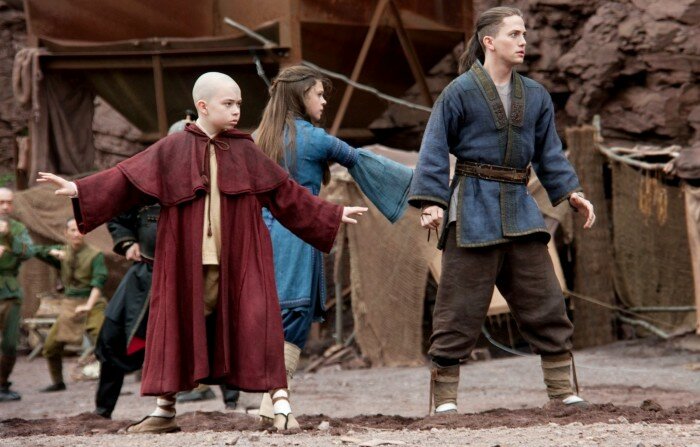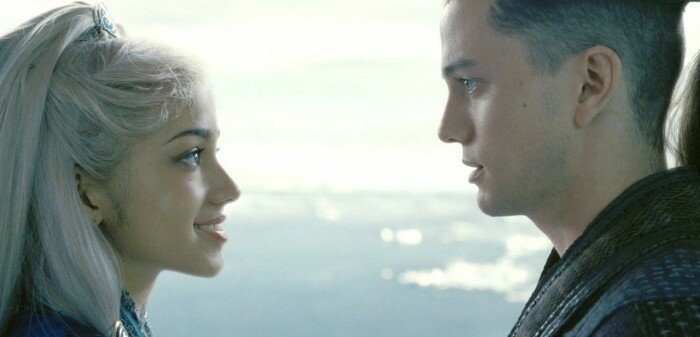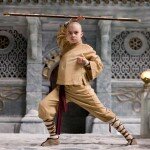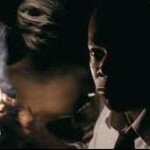When M. Night Shyamalan’s The Last Airbender made its way into US cinemas last July, critics bashed the film to a pulp like a hapless piñata. Once considered to be the next Hitchcock with film’s like The Sixth Sense and Unbreakable, Shyamalan’s career suffered a stroke with The Village and has been on life support ever since, Airbender being the director’s worst reviewed film to date. Yes, even worse than his last effort The Happening. And that’s a film about a homicidal breeze.
But is Airbender really as awful as everyone says?
In all honesty, no it’s not. While Shyamalan’s latest typifies sloppy and soulless filmmaking, it’s not about to give you retinal cancer like the US press would have you believe. It’s no worse than, say, this year’s remake of Clash of the Titans. Yet for someone who was actually looking forward to an absolute train wreck – if a film can’t be excellent, they may as well be hysterically awful – I don’t know whether it’s more disappointing that the film is bad, or that it isn’t quite bad enough to be considered good.
Based on the acclaimed animated television series Avatar: The Last Airbender, it’s clear even for someone who hasn’t watched the show that something was seriously lost in translation. Events take place in a mythical world divided into four nations; Earth, Air, Water and Fire (no prizes for guessing which one’s evil). Within each nation, select individuals awkwardly known as “Benders” – try not to laugh, Brits, we know what that implies – possess the ability to manipulate their native element. Keeping all the nations in harmony is the Avatar, a giant 3D smurf a powerful demigod who connects the physical world to the spiritual world and has the ability to bend all elements. The Avatar, however, has been MIA for the last century, allowing the tyrannical Fire nation to take the reins and exterminate/enslave all the foreign nations, possibly because they’re sick of being called flaming benders. Zzing!
With the backstory out of the way, the film kicks off when 14-year old water bender Katara (Nicola Peltz) and her benderless older brother Sokka (Jackson Rathbone) – two of the most Caucasian-looking Inuits you’re ever likely to see – discover a bald boy named Aang (Noah Ringer) frozen in the ice. It turns out Aang is not only the last remaining Airbender, the rest of whom were wiped out by the Fire nation many years ago, but also the long-lost Avatar. With the help of a flying beaver-dog (don’t ask), Aang embarks on a mission to restore balance to the world. This displeases the dictatorial Fire Lord Ozai (Cliff Curtis) and his exiled son Prince Zuko (Dev Patel), both obviously evil because they’re the only ethnic lead actors on screen. But that’s not racist according to Shyamalan, just “ironic.” Someone please get the man a dictionary…
Glimpses of the film’s strong source material can be seen in the overarching mythology, which is actually quite fascinating in a Howl’s Moving Castle meets Lord of the Rings kind of way. The film’s execution, however, is exactly that: an execution. Almost as if he’s trying to avoid any emotional engagement with the material, Shyamalan tells the story like a syndicated news journalist, reporting events with detached direction and lifeless, plot-driven screenwriting. The characters are nothing but colour-coded cogs cranking the story forward, almost as shallow as the fake 3D that exacerbates the murky and dizzying cinematography. The visual effects are clearly on a different plane to the action, which is without any excitement or momentum because the characters must stop and perform tai-chi whenever they go to attack. Watching a bunch of “warriors” wage war like a stuck-in-the-mud rendition of Swan Lake is not only extremely anti-climactic, it’s just plain ol’ silly. Perhaps if the film wasn’t so deadly serious about everything, such folly might have been more welcome.
When it comes to the performances, one thing’s for certain; casting director Douglas Aibel is going to want to leave this one off his CV. In his feature film debut, Noah Ringer is miscast – in both ethnicity and acting ability – as boy hero Aang. To be fair, the young performer isn’t given much to work with dialogue-wise, but the closest Ringer comes to pulling a facial expression is flaring his nostrils. My understanding is that one flair means he’s angry, two means he’s upset.
Slumdog Millionaire’s Dev Patel fairs no better as Prince Zuko, essentially playing a spoilt brat with daddy issues, while Twilight’s Jackson Rathbone gives his best Hayden Christensen impersonation as the brooding Sokka. To give his character any semblance of a purpose, Rathbone engages in a pathetic last-minute romance with Seychelle Gabriel (pictured above) as the bleach-bathing Water Princess Yue. The only young cast member who escapes relatively unscathed is newcomer Nicola Peltz as Katara. Watch closely and you can almost see her roll her eyes each time she is forced to deliver one awful chunk of expository dialogue after another.
In any case, it’s hard to believe that the M. Night Shyamalan who wrote this drivel is the same M. Night Shyamalan who scribed the captivating and chilling The Sixth Sense back in 1999. Eleven years on and the iconic line “I see dead people” has proven to be prophetic; take one look around the cinema during The Last Airbender and you’ll see some dead people too.
 Follow the author Anders Wotzke on Twitter.
Follow the author Anders Wotzke on Twitter.



![the_last_airbender15[1] the last airbender151 600x324 The Last Airbender (Review)](/wp-content/uploads/the_last_airbender151-600x324.jpg)




![Clash of the Titans [2010] (Review) Clash of the Titans [2010] (Review)](/wp-content/uploads/clash_of_the_titans011-150x150.jpg)
![Boy [2010] (Review) Boy [2010] (Review)](/wp-content/uploads/boy-01-e1283155907645-150x150.jpg)








